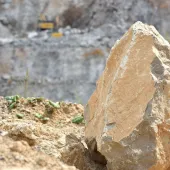Industry responses to the Autumn Statement
MPA, CPA, and CEA have their say on measures announced, or not, by Chancellor Jeremy Hunt
FOLLOWING the Chancellor’s Autumn Statement, the Mineral Products Association (MPA), Construction Products Association (CPA) and Construction Equipment Association (CEA) have issued responses, some more positive than others.
Key aspects of their responses are summarized below:
MPA deeply disappointed at lack of Government announcement on Carbon Border Adjustment Mechanism
THE Mineral Products Association (MPA) says it is deeply disappointed by the lack of commitment to a UK Carbon Border Adjustment Mechanism (CBAM) in the Autumn Statement, and that this missed opportunity should be urgently followed by publication of the promised consultation response announcing introduction of a CBAM.
The Association says failure to take this opportunity to demonstrate support for energy intensive industries – including cement – adds further uncertainty to the creation of a level playing field on carbon cost with overseas competitors, putting at risk domestic production and long-term investment in decarbonization.
The UK cement and concrete sector – represented by the MPA – provides a secure, domestic supply of essential materials to build the infrastructure needed for a low-carbon future and makes a vital contribution to UK gross value added (GVA), as well as supporting skilled jobs across the country.
However, the MPA says higher energy costs and historically higher carbon costs compared with international competitors, are undermining UK cement production. This is contributing to an increasing share of the UK cement market being supplied from other countries that do not account for their carbon impact.
The MPA has been calling for a CBAM covering cement as a method of equalizing carbon costs between domestic producers and imports. It says maintaining fair competition for UK plants is essential to ensure a reliable source of domestically produced cement and avoid the challenges associated with international trading markets. According to the Association, a well-designed, watertight CBAM can help maintain a level playing field with international competitors and reduce the risk of carbon leakage to countries with less-onerous climate policies.
A UK CBAM has also become more urgent following the establishment of the EU CBAM, and its full implementation in 2026. This creates a risk of significant volumes of imports, that currently go into the EU from non-EU producers without effective carbon pricing, being diverted to the UK unless a similar mechanism is put in place.
Dr Diana Casey, the MPA’s executive director for energy and climate change, said: ‘The delay in committing to a CBAM sends the signal that the UK is not the place to invest. Cement is essential to our everyday lives, but we cannot take its supply for granted and neither can we put ourselves at risk of unstable international trading markets.
‘Levelling the carbon cost between domestic production and imports is vital to attract the investment required to decarbonize and ensure our long-term security of supply. The UK Government must urgently commit to a CBAM on cement.’
A step in the right direction, says the CPA
Commenting on the Autumn Statement, Construction Products Association (CPA) economics director Noble Francis said: ‘With one eye on the General Election next year, this was always likely to be an Autumn Statement primarily aimed at helping working households and businesses.
‘Chancellor Jeremy Hunt highlighted that lower personal and business taxation will play a central role in the Conservative party’s approach for next year’s election and gave more clarity to the Government’s updated approach to boosting growth. A cut in the National Insurance rate from 12% to 10% and ‘full expensing’ for business investment were the two key headlines from Mr Hunt’s speech in the House of Commons today.
‘For UK construction product manufacturers, it is the ‘full expensing’ announcement that will resonate most with them,’ said Mr Francis. ‘The CPA was a key part of the letter calling for this measure to be made permanent and is pleased to see this confirmed today. This will allow companies to invest in the UK to reduce their tax by up to 25p for every £1 they spend on plant and machinery.’
Also of interest to the construction products industry was the Chancellor’s announcement on speeding up and providing more certainty for developers and investors on infrastructure delivery. ‘While such announcements on improving delivery are welcome, how effectively they translate into reality on the ground is yet to be seen,’ said Mr Francis.
‘The Government has published a policy paper, ‘Getting Great Britain building again: Speeding up infrastructure delivery’, which demonstrates that it finally understands the difficulties associated with delivering major infrastructure projects. It is disappointing, however, that it has not published an updated National Infrastructure and Government Construction Pipeline since September 2021 and announced in the Autumn Statement that there also will not be a revised National Infrastructure Strategy until next year.
‘This lack of certainty over the project pipeline means that it is difficult for all firms in the construction supply chain to justify signing-off significant new investments in skills and capacity, especially after all the Government announcements of infrastructure projects being paused, delayed, and cancelled this year.
‘This Autumn Statement marks a step in the right direction from government for the construction industry, but how much of it is electioneering as opposed to real action is not yet clear,’ said Mr Francis.
A promising groundwork for innovation and sustainable growth, says the CEA
Sharing her perspective on the Autumn Statement, Suneeta Johal, chief executive officer of the Construction Equipment Association (CEA), said: ‘The Autumn Statement represents a thoughtful and strategic approach, acknowledging the necessities of the industry and introducing a forward-looking strategy to enhance investment.
‘This statement marks a positive development, especially for the manufacturing sector, which values the emphasis on resolving enduring economic issues. The decision to make ‘full expensing’ permanent provides the clarity and stability businesses require for their investment decisions. The ability for companies to claim 100% capital allowances on qualifying plant and machinery investments and write-off the cost of investment in one go is not just a financial boon; it’s a catalyst for accelerated growth and modernization.
‘The Chancellor’s commitment of an additional £500 million to fund innovation centres, with a focus on AI, is another positive move. This investment not only positions the UK at the forefront of technological advancement, but also promises to usher in a new era of efficiency and capability across various industries. For the construction equipment sector, advancements in AI can lead to remarkable improvements in machinery intelligence, operational safety, and environmental sustainability,’ said Ms Johal.
'The introduction of a simplified R&D tax-relief system is also a welcome change. By merging the existing schemes, the Government is reducing bureaucratic hurdles, thus encouraging more companies to engage in innovative activities. This consolidation is likely to stimulate a surge in R&D initiatives within the construction equipment industry, fostering new developments in machinery and construction technology.'
Ms Johal concluded: ‘The Autumn Statement has set a promising groundwork for innovation and sustainable growth. Recognizing the UK’s potential in manufacturing, particularly in the construction equipment industry, the statement marks a step towards realizing this ambition. There’s an opportunity for even greater success with targeted policies that cater specifically to the needs of this sector. Such a strategic focus will not only fuel economic expansion but also position the UK as a frontrunner in sustainable technology and innovation, furthering Mr Hunt’s commendable efforts in this direction.’








